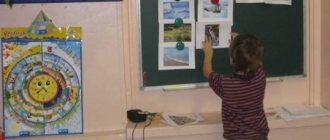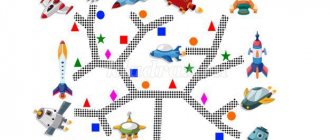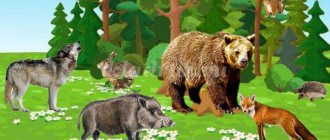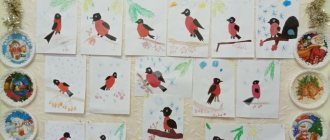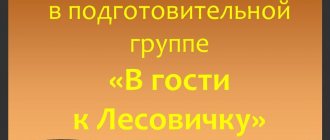International Mother Language Day in the senior group
Entertainment scenario “International Language Day” for children of senior and preparatory groups
Description: The entertainment is aimed at introducing children to the “International Language Day” holiday. This scenario will be useful for educators and music directors in preparing for GCD and entertainment. Goal: To introduce children to the “International Mother Language Day”. Develop curiosity, desire for new knowledge and native language. Objectives: - consolidate children’s knowledge about the culture and language of the Russian, Khakass and English people.
To promote increased interest in the native language, the sound of words in the languages of different nationalities. — to instill in children pride in their native language, for their people and a tolerant attitude towards representatives of other nationalities, their language and culture. Progress of the entertainment:
Children enter the hall to the music and sit on chairs.
Host: Hello guys, and dear guests. When we use the words “friends” in our speech, our speech becomes accurate, bright, expressive, and interesting. What helps us communicate? (language). Today is February 21st every year, the country celebrates International Mother Language Day. There are many languages on the globe. Even when you were just born and were very small, your mothers sang lullabies to you in your native language. How do you understand what your native language is? (which we speak). What language do we speak? (in Russian) Host: What republic do we live in? What nationalities live in our republic? Each nation has a unique culture, history, traditions and, of course, language. Today at our holiday we will learn about representatives of different nations. To the music, a teacher in Russian costume enters the hall: Hello! Our Russian language is rich and beautiful! There are so many words in it, this is the native language of Pushkin, Tolstoy, Gogol, whose fairy tales we often read. Love your Motherland, your language, your people! Children: On the day of your native language, I wish you to preserve it. So that the speech is easy, Swear words without repeating, Speak well - A kind word is pleasant! This is why the language came, so that we can communicate clearly in it. Host: Name proverbs and sayings that talk about language. Children: - The tongue is sharper than a razor. - Language will take you to Kyiv. - A tongue without bones, it babbles whatever it wants. - My tongue is my enemy. - Don’t rush with your language, hurry with your actions. - Listen more and talk less. Guest from Russia: Now let's play. Russian folk game "Zarya" Children stand in a circle, hold their hands behind their backs, and one of the players - Zarya - walks behind with a ribbon and says: Zarya - lightning, Red maiden, Walked across the field, Dropped the keys, Golden keys, Blue ribbons, Rings entwined - She went for water. With the last words, the driver carefully places the ribbon on the shoulder of one of the players, who, noticing this, quickly takes the ribbon, and they both run in different directions in a circle. The one who is left without a place becomes Dawn. The game repeats itself. Host: Guys, the Russian people have a lot of not only games, but also songs. Now we will perform the round dance “Like on thin ice”
Song - round dance “Like a thin summer” - preparatory group (piano) Presenter: Of course, many people of different nationalities live in Khakassia (Russians, Khakassians, Ukrainians and Belarusians) A guest from Khakassia (teacher) enters the hall accompanied by music . words in the Khakass language.
Guys, let’s play with you
the Khakass folk game “Bear and Stump” - senior group:
The driver and the “bear” are selected, the rest are “stumps”. They sit in a circle facing the center of the circle, leaving passages between them. The driver moves between the stumps, lightly touching the tops of the heads while singing the song: “Chubs, chabs, bear, stump.” A bear sneaks up next to catch and stain him. If he catches them, they will both become stumps and sit down, and others will be chosen instead. And everything starts all over again. Guest from Russia: Every nation has its own traditions, culture and language. All this distinguishes each nation from each other. This is what makes people proud of belonging to a particular nation. And the language conveys all the features of the people’s way of life. Therefore, many of them, even small ones, try with all their might to preserve their language, paying tribute to their ancestors and their uniqueness. Presenter: In our kindergarten we educate children of different nationalities. We hope that everyone’s native language is dear and interesting. The same word sounds different in different languages. Guest from Russia: In Russia, Russian is the language of interethnic communication. But there is also a language of international communication - English. In any country in the world they study and know English, wherever you go on a trip, English is your main assistant. A guest from England enters to the music and greets the children: Hello! Offers to play an English game with the children: “Let’s do everything as I do” (voiced, phonogram plus) Performed in a circle, standing still, with the end of each phrase - the leader’s movements are repeated.
1. Do you all like to play?
(yes) Do you all like to play? (yes) Come on, all together, all at once. Well, shall we play now? - 2 rub. 2. Come on, clap like I do - clap, clap. Come on, clap like me. Come on, everyone together, everyone at once. Only here they clap. - 2 r 3. Come on, stomp like me. Let's all stomp like me. Come on, all together, all at once. Only here they stomp like that. 4. Come on, say hello! Well, say hello! Come on, all together, all at once. They greet you like that only here - 2 r 5. Come on, say: Ha-ha-ha, Come on, say: Ha-ha-ha, Come on, everyone laughs like that, all at once, only here. 6. Let's all shout: Hurray-ah-ah! Let's all shout: Hurray! Come on, all together, all at once, hurray! Only here we have fun! Host: Indeed, all languages are beautiful, every language is beautiful. Don’t forget, love your native language, take care of it, be proud of it! Presenter: Live together in peace and harmony with children of different nationalities. I wish you happiness, health, kindness. And now we invite you to sing a song about friendship “I want” (children from the vocal circle)
Song “I want”, arrangement Yuri Elash 1. So that you and I can be friends I want, and I want. I want everyone to be happy, and I want to. To make the flowers smile I want, and I want. I want the stars to light up, and I want them. 2. I want to become my cherished dream, and I want to. And I want to be fulfilled in spring, and I want. So that mom doesn't be sad. I want it, and I want it. And she always loved me. I want, and I want. Host: This ends our holiday. Thank you all for your attention. Photo for memory. Costumes: Russian, Khakass, English; ribbon, horse on a stick, costumes for Vanya and girlfriends; bear mask; It is possible for children R.N. costumes. Repertoire: Round dance “Like on thin ice”, song “I want” Games “Dawn”, Khakass folk game – “The Bear and the Stump” English game – “Let’s do everything as I do”
We recommend watching:
Winter fun for the senior group. Winter fun. Scenario: Winter fun outside for children. Scenario Sports festival for children of senior preschool age. Winter fun Winter fun in the senior group of kindergarten
Similar articles:
The fairy tale “Cat-Voevoda in a new way.” Scenario for children 5-6 years old
Winter fair of games and fun for older preschoolers
Winter birthday day in kindergarten. Senior group
Winter theatrical entertainment in the senior group
Winter games for older children in kindergarten
Cultivating love for the native language in kindergarten
Ilsiyar Akhmetova
Cultivating love for the native language in kindergarten
The preschool period is considered the most favorable for mastering a language due to the psychological characteristics of children. At this age, children experience speech and mental activity, active memory, and ease of formation of positive motivation for speech activity.
Love for the Motherland and Fatherland cannot be imagined without the native language . After all, only through love for your native language , for your people, their national traditions can you cultivate love for your multinational fatherland, respect for the culture of another people next to whom you live. in the language of the people, the people and their homeland are spiritualized.
about the need to know his native language : “As many languages , I am a human being, but the wealth embodied in the treasures of the languages of other peoples remains inaccessible to a person if he has not mastered native speech and has not felt its beauty.” The native language can be called the main component of national culture; it is a conductor of oral folk art . By teaching children their native language in kindergarten , teachers solve the important task of instilling love , caring attitude, respect, and interest in their small homeland, in their native land . Work on local history is carried out in all groups, starting from early preschool age. for this in our kindergarten . There are groups teaching Tatar and Bashkir colloquial speech, which are equipped with everything necessary for learning the native language . In 2001, employees created a mini museum of local history. The museum has enormous pedagogical value and cultural potential; it allows us to awaken children’s interest in the surrounding reality at a qualitatively new level, unite teachers, children and parents with the interesting task of collecting exhibits, preparing thematic exhibitions, excursions and holidays. Our museum regularly hosts classes for “Pearls” circles (for teaching Tatar colloquial speech)
Yangirova R.F. and “Origins”
(on teaching Bashkir colloquial speech)
by Sadykova A.M. In classes, children get acquainted with authentic household items and applied arts, with the national clothing of the peoples of the Republic of Belarus, with the way of life of our ancestors.
And, of course, they expand their vocabulary in their native language .
As the head of the methodological association of teachers of national groups of preschool educational institutions of the Kalininsky district of the city of Ufa, I try to organize full-fledged work on the preservation and study of native languages in a preschool institution. At seminars, discussing issues related to the native language , we came to the conclusion that this problem cannot be solved without the participation of parents. It is necessary to carry out systematic work with parents to preserve their native language . Parents would be happy for their children to know their language , but do not know what to do to preserve it. It is gratifying that special manuals are currently being published in their native language , which can be used to study with a preschool child in the family. And we, teachers, need to be able to offer parents the necessary literature or manuals. We must not forget about our cultural past, about our native language . That is why the native language , like father and mother, should become an integral part of the child’s soul.
Pedagogical project “Let's Play Together” Currently, there is a gradual reform of Russian pedagogy, including preschool. Today the most relevant is.
Project on the topic: “Involving parents in active participation in the correctional process to overcome a child’s speech defect.” Currently, there is a steady increase in the number of children with problems in speech development. Family is the first step in a child’s development as a parent.
Source
On the topic: methodological developments, presentations and notes
I believe that it is necessary to introduce a regional studies component into teaching English, so throughout the entire academic year I conduct educational events dedicated to various topics.
“Russian Birch Festival” is timed to coincide with the celebration of the Holy Trinity Day. This holiday has ancient roots in Rus' and harmoniously combines the traditions of Christianity and paganism. The purpose of entertainment poses.
Today we often hear from television screens and from leading politicians the word “tolerance” that has recently become familiar to us. At the proposal of UNESCO, the first decade of the new century was declared a Decade.
To give an idea of International Mother Language Day and to enrich the spiritual world of children. Develop a love and interest in your native language, poetry; learn to respect the language and culture of other peoples; to work on.
International Mother Language Day is a fairly young holiday - it has been celebrated since February 2000 in order to attract attention to the native language. This is already relevant in preschool age, especially for children.
Source
Summary of the conversation “Our native language” (preparatory group)
Goals: to introduce children to Mother Language Day; create conditions for enriching the spiritual world of children; develop a caring attitude towards the native language, customs and culture, as well as the traditions of other peoples; promote the development of speech, thinking and memory.
Tasks:
Form of organization : conversation.
Equipment : globe, geographical map of the world with countries, map of hometown, cards with pictures (PVF Grammar in pictures. Polysemantic words. For games and activities with children 3-7 years old. Federal State Educational Standard).
Progress of the lesson
Q: Guys, today we will have a very interesting lesson for you. Look what I brought with me. Who knows what this is?
Q: What is a globe? Who can explain it to me?
D: This is a small model of our planet.
Q: Our globe is painted in different colors. It's not just like that! Each color has its own meaning. Seas, rivers and oceans are colored blue. Green – forests and plains. And brown and yellow are mountains and deserts. What else can we see on the globe?
